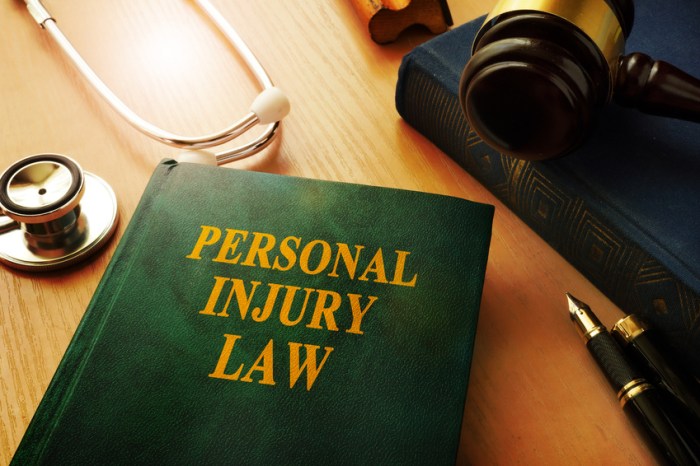Personal injuries lawyers are essential allies in the pursuit of justice and compensation for those who have suffered physical, emotional, or financial harm due to the negligence or wrongdoing of others. Understanding your rights and navigating the legal process can be daunting, but with the guidance of an experienced personal injury lawyer, you can maximize your chances of a successful outcome.
From selecting the right attorney to filing a claim and negotiating a settlement or proceeding to trial, this comprehensive guide will empower you with the knowledge and strategies you need to protect your rights and obtain the compensation you deserve.
Personal Injury Law Overview

Personal injury law encompasses the legal principles and practices that govern civil cases involving physical or psychological harm caused by the negligence or intentional acts of another party. It aims to provide compensation to victims for their injuries and hold responsible parties accountable for their actions.
Common types of personal injury cases include:
- Motor vehicle accidents
- Slip and fall accidents
- Medical malpractice
- Product liability
- Wrongful death
Scenarios that constitute personal injuries may involve:
- Physical injuries such as broken bones, lacerations, or burns
- Psychological injuries such as anxiety, depression, or post-traumatic stress disorder
- Loss of income or earning capacity
- Medical expenses
- Pain and suffering
Choosing a Personal Injury Lawyer
Selecting a personal injury lawyer is crucial for maximizing your compensation and ensuring your rights are protected. Here’s a comprehensive guide to help you make an informed decision:
Factors to Consider:
- Specialization: Choose a lawyer who focuses primarily on personal injury law, as they possess specialized knowledge and experience.
- Track Record: Research the lawyer’s past successes, including settlements and verdicts obtained for similar cases.
- Fees: Understand the lawyer’s fee structure and ensure it aligns with your financial situation.
- Communication and Responsiveness: Select a lawyer who is easily accessible, communicates clearly, and promptly responds to your inquiries.
- Referrals and Reviews: Seek recommendations from trusted sources or read online reviews to gain insights from previous clients.
Interviewing Potential Lawyers
Once you have identified a few potential lawyers, schedule interviews to assess their qualifications and personality:
- Prepare Questions: Ask about their experience, fees, and approach to handling personal injury cases.
- Observe their Demeanor: Pay attention to their professionalism, empathy, and ability to connect with you.
- Discuss Fees and Payment Options: Clarify the lawyer’s fees, payment plans, and any potential out-of-pocket expenses.
- Trust Your Instincts: Choose a lawyer you feel comfortable with and trust to represent your interests effectively.
Filing a Personal Injury Claim: Personal Injuries Lawyers
Filing a personal injury claim involves several steps, including gathering evidence, filing a complaint, and negotiating a settlement. It’s crucial to gather as much evidence as possible, such as medical records, witness statements, and photographs of the accident scene.
Importance of Gathering Evidence
Gathering evidence is essential for establishing liability and proving the extent of your injuries. Medical records document the nature and severity of your injuries, while witness statements provide accounts of the accident. Photographs of the scene can illustrate the conditions that contributed to the accident.
Statute of Limitations
Each state has a statute of limitations for filing personal injury claims. This time limit varies, so it’s important to contact an attorney promptly to ensure your claim is filed within the required timeframe.
Personal Injury Damages

Personal injury damages refer to the monetary compensation awarded to victims who have suffered physical, emotional, or financial harm due to the negligence or wrongdoing of another party. These damages aim to make the victim whole again by compensating them for their losses and providing a sense of justice.
There are three main categories of damages in personal injury cases: compensatory, punitive, and nominal.
Compensatory Damages, Personal injuries lawyers
Compensatory damages are intended to reimburse the victim for their actual losses and expenses incurred as a result of the injury. They can be further divided into:
- Economic Damages: These include quantifiable expenses such as medical bills, lost wages, property damage, and future medical expenses.
- Non-Economic Damages: These encompass subjective losses that are more difficult to quantify, such as pain and suffering, emotional distress, loss of enjoyment of life, and disfigurement.
Punitive Damages
Punitive damages are awarded in addition to compensatory damages when the defendant’s conduct was particularly egregious or reckless. They are intended to punish the defendant and deter similar behavior in the future.
Nominal Damages
Nominal damages are a small amount of money awarded when the victim has suffered a legal injury but has not incurred any actual damages. They serve to recognize the violation of the victim’s rights.
Personal injuries lawyers play a crucial role in the field of law , specializing in representing individuals who have suffered physical, emotional, or financial harm due to the negligence or wrongdoing of others. These legal professionals possess a deep understanding of tort law, which governs civil wrongs, and are skilled in navigating the complexities of personal injury cases to secure fair compensation for their clients.
Common Damage Awards
The amount of damages awarded in personal injury cases can vary widely depending on the severity of the injury, the victim’s circumstances, and the jurisdiction. Some common examples of damage awards include:
- $100,000 for a broken leg
- $500,000 for a spinal cord injury
- $1 million for a wrongful death
Settlement and Trial

The settlement and trial process in personal injury cases involves several stages, including negotiation, mediation, arbitration, and potentially a trial if a settlement cannot be reached.
Negotiation is the initial stage where the injured party and the defendant or their insurance company attempt to reach an agreement on a settlement amount. If negotiations fail, mediation or arbitration may be considered.
Mediation
Mediation is a form of alternative dispute resolution where a neutral third party (the mediator) facilitates negotiations between the parties. The mediator does not make a decision but helps the parties communicate and reach a mutually acceptable settlement.
Arbitration
Arbitration is another form of alternative dispute resolution, but unlike mediation, the arbitrator makes a binding decision that is generally final and cannot be appealed.
Trial
If settlement negotiations, mediation, and arbitration fail, the case may proceed to trial. The trial process typically involves the following steps:
- Jury selection: A jury of 6-12 people is selected to hear the case and determine the outcome.
- Opening statements: Both the plaintiff’s attorney and the defendant’s attorney present their opening statements, outlining their arguments and evidence.
- Evidence presentation: The parties present their evidence, including witness testimony, documents, and physical evidence.
- Closing arguments: The attorneys present their closing arguments, summarizing their evidence and asking the jury to rule in their favor.
- Jury deliberation: The jury retires to deliberate and reach a verdict.
- Verdict: The jury announces its verdict, which may include an award of damages to the plaintiff.
Key Questions Answered
What types of cases do personal injury lawyers handle?
Personal injury lawyers handle a wide range of cases, including car accidents, slip and falls, medical malpractice, product liability, and wrongful death.
How do I choose the right personal injury lawyer?
When choosing a personal injury lawyer, it is important to consider their experience, track record, and fees. You should also feel comfortable with the lawyer and confident in their ability to represent your interests.
What is the statute of limitations for filing a personal injury claim?
The statute of limitations for filing a personal injury claim varies from state to state. It is important to contact a personal injury lawyer as soon as possible after your accident to ensure that you do not miss the deadline for filing your claim.




